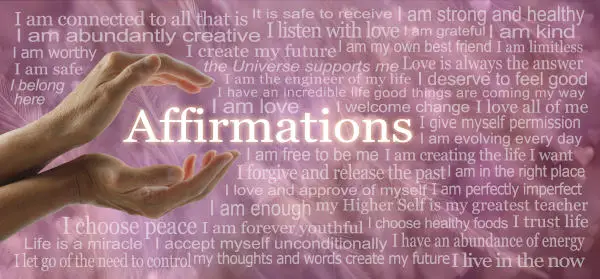Welcome to our journey into the transformative potential of affirmations within the realm of manifestation and the Law of Attraction. Throughout this article, we’ll delve into the intricate relationship between affirmations and the universal principles that shape our reality. By understanding these principles and harnessing the power of affirmations, you can unlock the keys to manifesting your deepest desires with intention and clarity.
Throughout this journey, we will unravel misconceptions, and provide practical guidance that illuminate the path to manifestation mastery. Whether you’re seeking abundance, love, personal growth, or any other manifestation, this article is designed to equip you with the knowledge and tools to manifest your dreams into reality.
Understanding the Connection Between Affirmations and the Law of Attraction
The Law of Attraction is a fundamental principle in the realm of manifestation, emphasizing the power of thoughts and beliefs in shaping our reality. At its core, this law suggests that like attracts like, meaning the energy we emit into the universe through our thoughts and emotions draws corresponding experiences and opportunities into our lives.
Affirmations serve as potent tools within the Law of Attraction framework. By definition, affirmations are positive statements that assert our desired outcomes as if they are already true. They operate on the principle that the subconscious mind cannot distinguish between reality and imagination, thereby influencing our beliefs and behaviors to align with our stated intentions.
The Pivotal Role of Affirmations
Affirmations act as catalysts for aligning our thoughts and beliefs with our desires. When consistently practiced, they help to reprogram the subconscious mind, shifting limiting beliefs and negative thought patterns towards ones that support our goals and aspirations.
Through affirmations, we consciously direct our focus and attention towards what we want to manifest, reinforcing a mindset of abundance, success, and fulfillment. By repeatedly affirming our desired outcomes with conviction and positivity, we signal to the universe our readiness to receive and attract those experiences into our lives.
Renowned figures in the field of the Law of Attraction, such as Louise Hay and Esther Hicks, emphasize the significance of affirmations in deliberate creation. They advocate for the consistent practice of affirmations as a means to elevate one’s vibration and harmonize with the frequency of their desires.
In essence, affirmations serve as the bridge between our internal world of thoughts and beliefs and the external world of manifested experiences. By understanding and harnessing the connection between affirmations and the Law of Attraction, individuals can proactively shape their reality and manifest their deepest desires.

Crafting Affirmations for Specific Manifestations
Creating affirmations tailored to your specific desires and goals is a powerful practice that can accelerate the manifestation process. Here’s a step-by-step guide to help you craft affirmations that resonate with your deepest aspirations:
- Identify Your Desires: Begin by clarifying what you truly desire in various areas of your life, whether it’s wealth, relationships, personal growth, or any other aspect you wish to improve or manifest.
- Focus on the Positive: Frame your affirmations in a positive light, stating your desires as if they are already happening or achievable. Avoid using negative language or focusing on what you lack. For example: Instead of “I won’t struggle financially,” declare, “I am a wealth magnet, attracting prosperity and abundance into my life.”
- Be Specific and Detailed: Clearly define your intentions with precise language. The more specific and detailed your affirmations are, the clearer your instructions to the universe become. For example: instead of a vague “I want to be happy,” craft affirmations that paint a vivid picture of your ideal outcome, like: “I am filled with joy and gratitude for my fulfilling relationships and abundant life.”
- Embrace Affirmations in Present Tense: Phrase your affirmations in the present tense to reinforce the belief that your desires are already manifesting in the here and now. For example, instead of saying, “I will be wealthy,” say, “I am attracting wealth and abundance into my life effortlessly.”
Related reading: The Emotion-Manifestation Equation: Attract Your Dreams by Aligning Your Feelings – Opens in new tab
Examples of Affirmations for Common Manifestations
| Category | Affirmations |
|---|---|
| Wealth | “I am a magnet for financial prosperity and abundance.” |
| “Money flows to me effortlessly from multiple sources.” | |
| “I am worthy of receiving unlimited wealth and success.” | |
| “I manage my finances with wisdom and ease. My income consistently grows, and I feel abundant and secure.” | |
| Relationships | “I am surrounded by loving and supportive relationships.” |
| “I attract my ideal partner who aligns with my values.” | |
| “Every day, I nurture and strengthen my relationships with love and compassion.” | |
| “I attract healthy and supportive relationships filled with love, trust, and mutual respect.” | |
| Personal Growth | “I am continuously evolving into the best version of myself.” |
| “I embrace challenges as opportunities for growth.” | |
| “I trust in my ability to overcome obstacles and manifest my dreams.” | |
| “I am open to learning and growth. I embrace challenges and use them to become my strongest, most resilient self.” | |
| Health | “I am grateful for my vibrant health and well-being, and I nourish my body with love and care every day.” |
| “I prioritize my health and make choices that support my optimal well-being, knowing that I deserve to thrive in every aspect of my life.” | |
| “Every cell in my body radiates with vitality and energy, and I am in perfect harmony with my physical, mental, and emotional health.” | |
| “I am resilient, and my body has an innate ability to heal itself. I trust in my body’s wisdom and support its natural healing processes.” |
Tips for Maintaining a Positive and Focused Mindset:
- Consistency is Key: Set aside dedicated time each day to repeat your affirmations with conviction and belief. Consistent practice strengthens their effectiveness.
- Visualization: Supplement your affirmations with visualization techniques, vividly imagining yourself already experiencing your desired outcomes. Visualization enhances the emotional resonance of your affirmations.
- Let go of resistance: Don’t dwell on doubts or fears. Trust the process and believe in your ability to manifest your desires.
- Gratitude Practice: Cultivate an attitude of gratitude for what you already have and for the manifestations yet to come. Gratitude amplifies the positive energy you emit into the universe.
- Celebrate small wins. Acknowledge and celebrate every step forward, no matter how small. This keeps your momentum going and reinforces your belief in the power of affirmations.
Remember, affirmations are a powerful tool, but they work best when combined with inspired action. As you consistently affirm your desires and take aligned steps towards them, you’ll be amazed at the power you hold to shape your reality.
Common Misconceptions about the Law of Attraction and Affirmations
In the journey of understanding and applying the Law of Attraction and affirmations, it’s crucial to address common misconceptions that may hinder progress and undermine their effectiveness. Let’s unravel some of these misunderstandings and shed light on the truth:
Misconception: The Law of Attraction is Magic or Wishful Thinking
Debunked: While the Law of Attraction may seem magical in its ability to manifest desires, it operates on the principles of vibrational alignment and the power of the subconscious mind. It’s not about wishful thinking alone but about aligning thoughts, emotions, and actions to create tangible outcomes.
Misconception: Law of Attraction negates negative experiences
Debunked: Life will inevitably throw curveballs. The Law of Attraction doesn’t promise a perfect, problem-free existence. It’s about developing the resilience to navigate challenges with a positive mindset and use them as stepping stones to growth.
Misconception: Affirmations Alone Can Manifest Anything Instantly
Debunked: Affirmations are powerful tools, but they work in conjunction with inspired action, intention, and alignment with universal principles. Manifestation requires consistent effort, patience, and belief in the process. Affirmations serve as catalysts for change, but they must be accompanied by deliberate actions towards one’s goals.
Related reading: Self-Suggestion Secrets to Transform Your Life – Opens in new tab

Misconception: Negative Thoughts Will Completely Block Manifestations
Debunked: While it’s essential to maintain a positive mindset, occasional negative thoughts are a natural part of the human experience. The key lies in acknowledging and releasing these negative thoughts rather than dwelling on them. Consistent practice of positive affirmations can gradually shift the balance towards a more optimistic outlook.
Misconception: Affirmations Work Instantly for Everyone
Debunked: Manifestation is a highly individualized process influenced by various factors such as belief systems, emotions, and subconscious programming. While some may experience rapid results with affirmations, others may require more time and persistence. Patience and trust in the process are paramount.
Addressing Potential Pitfalls
- Lack of Belief: Doubt and skepticism can sabotage the effectiveness of affirmations. It’s essential to cultivate unwavering belief in the power of affirmations and the Law of Attraction, even in the face of uncertainty.
- Resistance to Change: Resistance to change or fear of success can hinder manifestation efforts. It’s crucial to address underlying fears and limiting beliefs through introspection, mindset work, and self-awareness.
Evidence-Based Validation of affirmations
There is a substantial body of research supporting the efficacy of affirmations in rewiring the brain, enhancing self-esteem, and improving overall well-being. Self-affirmation theory posits that people are motivated to maintain a positive self-view and that threats to perceived self-competence can be counteracted by self-affirmations 1. Studies have shown that self-affirmations can restore self-competence by allowing individuals to reflect on sources of self-worth, such as core values.
Neuroimaging studies have demonstrated that self-affirmation activates brain systems associated with self-related processing and reward, and these neural pathways are reinforced by future prospection.
For example, a study using functional magnetic resonance imaging (fMRI) found that participants who were affirmed (compared with unaffirmed) showed increased activity in key regions of the brain’s region involved in positive valuation and self-related information processing when considering future-focused fundamental values (in contrast to daily activities) 2. On top of that, this brain activity predicted changes in sedentary behavior that were in line with successful affirmation in reaction to a different physical exercise intervention.

In terms of benefits, self-affirmations have been shown to decrease health-deteriorating stress, increase physical behavior, make people less resistant to threatening messages, and improve academic achievement. They can also help individuals perceive otherwise threatening messages with less resistance, including interventions, and make them more likely to respond positively to health messages 3 4 5 6 7 8.
Furthermore, self-affirmations can be particularly effective for individuals with low self-esteem, those who feel insecure in their relationships, and those who experience social identity threat in a setting 9 10. The ability to generate self-affirming meanings spontaneously and the ability to create affirming events, reminders, or meanings also contribute to well-being and health 11.
In summary, research supports the use of affirmations in rewiring the brain, enhancing self-esteem, and improving overall well-being. These benefits are achieved by activating brain systems associated with self-related processing and reward, decreasing stress, increasing physical behavior, and improving academic achievement.
Affirmations are particularly effective for individuals with low self-esteem, those who feel insecure in their relationships, and those who experience social identity threats in a setting.
Conclusion
The journey of manifestation through affirmations is a beautiful blend of intention, belief, and inspired action. By incorporating the practices outlined in this guide, you’ll be well on your way to transforming your thoughts, attracting positive experiences, and ultimately, shaping your reality according to your desires.
Remember, affirmations are a tool to empower you, not a magic solution. Embrace the process, celebrate your progress, and trust in the universe to orchestrate the perfect timing for your manifestations to unfold. Now that you’re armed with this knowledge, go forth and start manifesting your dreams!
Check out our recommendations at “Affirmations Bookshelf” and many free resources at our “Free Library“
Sources
- Cascio CN, O’Donnell MB, Tinney FJ, Lieberman MD, Taylor SE, Strecher VJ, Falk EB. Self-affirmation activates brain systems associated with self-related processing and reward and is reinforced by future orientation. Soc Cogn Affect Neurosci. 2016 Apr;11(4):621-9. doi: 10.1093/scan/nsv136. Epub 2015 Nov 5. PMID: 26541373; PMCID: PMC4814782. ↩︎
- Cascio CN, O’Donnell MB, Tinney FJ, Lieberman MD, Taylor SE, Strecher VJ, Falk EB. Self-affirmation activates brain systems associated with self-related processing and reward and is reinforced by future orientation. Soc Cogn Affect Neurosci. 2016 Apr;11(4):621-9. doi: 10.1093/scan/nsv136. Epub 2015 Nov 5. PMID: 26541373; PMCID: PMC4814782. ↩︎
- Cohen GL, Sherman DK. The psychology of change: self-affirmation and social psychological intervention. Annu Rev Psychol. 2014;65:333-71. doi: 10.1146/annurev-psych-010213-115137. PMID: 24405362. ↩︎
- Cooke R, Trebaczyk H, Harris P, Wright AJ. Self-affirmation promotes physical activity. J Sport Exerc Psychol. 2014 Apr;36(2):217-23. doi: 10.1123/jsep.2013-0041. PMID: 24686957. ↩︎
- Critcher CR, Dunning D. Self-affirmations provide a broader perspective on self-threat. Pers Soc Psychol Bull. 2015 Jan;41(1):3-18. doi: 10.1177/0146167214554956. Epub 2014 Oct 15. PMID: 25319717. ↩︎
- Epton T, Harris PR. Self-affirmation promotes health behavior change. Health Psychol. 2008 Nov;27(6):746-52. doi: 10.1037/0278-6133.27.6.746. PMID: 19025270. ↩︎
- Falk EB, O’Donnell MB, Cascio CN, Tinney F, Kang Y, Lieberman MD, Taylor SE, An L, Resnicow K, Strecher VJ. Self-affirmation alters the brain’s response to health messages and subsequent behavior change. Proc Natl Acad Sci U S A. 2015 Feb 17;112(7):1977-82. doi: 10.1073/pnas.1500247112. Epub 2015 Feb 2. PMID: 25646442; PMCID: PMC4343089. ↩︎
- Harris PR, Mayle K, Mabbott L, Napper L. Self-affirmation reduces smokers’ defensiveness to graphic on-pack cigarette warning labels. Health Psychol. 2007 Jul;26(4):437-46. doi: 10.1037/0278-6133.26.4.437. PMID: 17605563. ↩︎
- Layous, K., Davis, E. M., Garcia, J., Purdie-Vaughns, V., Cook, J. E., & Cohen, G. L. (2017). Feeling left out, but affirmed: Protecting against the negative effects of low belonging in college. Journal of Experimental Social Psychology, 69, 227–231. https://doi.org/10.1016/j.jesp.2016.09.008 ↩︎
- Claude M. Steele. The Psychology of Self-Affirmation: Sustaining the Integrity of the Self. https://doi.org/10.1016/S0065-2601(08)60229-4 ↩︎
- Geoffrey L. Cohen1 and David K. Sherman. The Psychology of Change: Self-Affirmation and Social Psychological Intervention. (pdf) ↩︎
Stay in Touch
 Join our newsletter by using the forms on this website or click here!
Join our newsletter by using the forms on this website or click here! Follow us on Google News
Follow us on Google News Follow us on Facebook
Follow us on Facebook
Feature Image from Depositphotos







